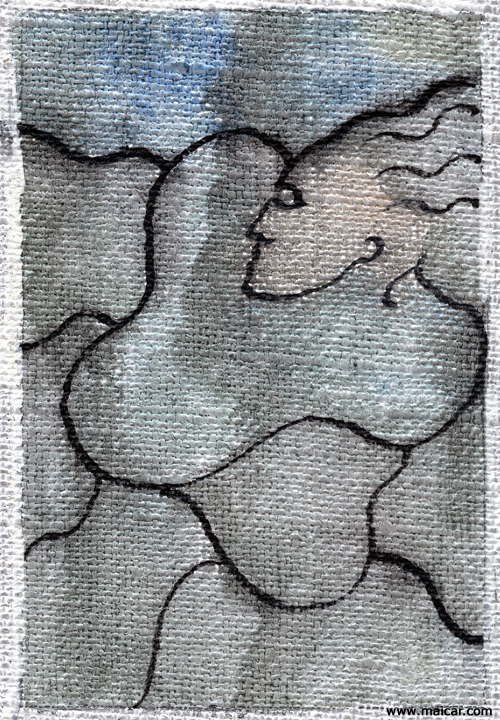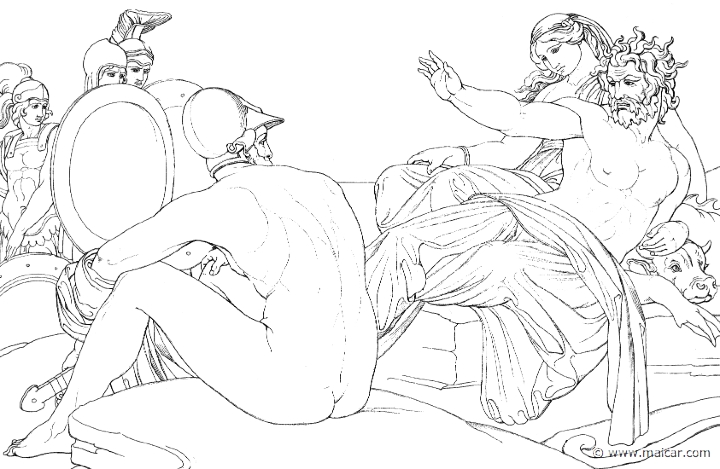|

|
Proteus. C. Parada (1989).
|
|
|
"... I repeat to you what I said to Cleinias just now, that you do not perceive the wonderful nature of our visitors' skill. Only they are unwilling to give us a display of it in real earnest, but treat us to jugglers' tricks in the style of Proteus the Egyptian adept. So let us take our cue from Menelaus, and not leave hold of these gentlemen till they give us a sight of their own serious business." (Plato, Euthydemus 288b).
"... but you are only deceiving me, and so far from displaying the subjects of your skill, you decline even to tell me what they are, for all my entreaties. You are a perfect Proteus in the way you take on every kind of shape, twisting about this way and that..." (Plato, Ion 541e).
"... Proteus, of sea-green hue, traverses the mighty main in his car drawn by fishes and a team of two-footed steeds." (Virgil, Georgics 4.388).
|
|
Proteus 2, "The Old Man of the Sea," knows all that has been, is now, and lies in store. But he is reluctant to answer questions about such matters. Therefore, by his art he changes his real figure for a false semblance, and when he pleases he returns to his true form. Proteus 2 lived in the sea off Egypt, and for that reason he is often identified with Proteus 3, an Egyptian king.
Remarkable abilities
The most remarkable feature of Proteus 2 is his ability to change form. But whereas some whose form has been changed remain in their new state, Proteus 2 can continuously assume new forms, looking as a young man, a lion, a boar, a serpent, a bull, a stone, a tree, water, flame, or whatever he pleases. Proteus 2 is among the gods who revealed that Thetis would become the mother of a youth who would outdo his father's deeds. It is because of this prophecy that Zeus renounced her love. And fearing that a son of his own would take over the rule of the heaven, the god resolved that Thetis should marry a mortal, Peleus. But to conquer the nereid Thetis was not an easy
task for Peleus, since she, like Proteus 2, could change her form, becoming in the arms of anyone who strived to hold her, a bird or a tree. So far Peleus clung on her, but
when she showed herself in the guise of a tigress,
he lost his courage, and loosed his hold. Having failed in his first attempt, Peleus poured wine into the sea and sacrificed to the gods, praying for help; and then Proteus 2 came from the deep, and instructed him:
"... And
though she take a hundred lying forms, let her not
escape you, but hold her close, whatever she may
be, until she take again the form she had at
first." (Proteus 2 to Peleus. Ovid, Metamorphoses 11.250).
Following the god's instructions, Peleus could finally
conquer Thetis, who was reluctant to marry him. For
a mortal was not the best she could get, being
herself a goddess. But she knew what had happened,
for she said:
"It is not
without some god's assistance that you
conquer." (Thetis to Peleus. Ovid, Metamorphoses 11.263).
Menelaus' story about Proteus 2
Proteus 2 himself was later defeated by Menelaus in the same
way as Thetis was conquered by Peleus. Or so Menelaus himself
claimed when he received Odysseus' son Telemachus in his
palace. Telemachus had come to see whether Menelaus could give him
any news of his father, whom he wished to find as
soon as possible, given that a set of scoundrels
were plundering his estate while competing with
each other for the hand of his mother Penelope.
One morning then, Menelaus told Telemachus about his meeting with Proteus 2. He said that, for having omitted to make
offerings to the gods, these kept him and his men
idle for twenty days in the island of Pharos off
the mouths of the river Nile, not being able to
sail as there was not even a sign of a breeze. When after some time the diminished supplies had exhausted his men, a goddess took pity on him. She was Proteus 2's daughter Eidothea 1, whom he met while he was walking by himself, away from the others. The goddess, being direct, asked him at once:
"Sir, are you
an utter fool? Are you weak in the head?" (Eidothea 1 to Menelaus. Homer, Odyssey 4.370).
... or was it, she wondered, that he loved hardships and to let his men grow weaker day by day? Menelaus replied
that the whole thing was against his will, and that
he probably was being punished for having offended
the immortals; but that he would certainly like to
know who among the gods had confined him in that
island, and how he could finally get home. It was then that the goddess revealed that the island was the haunt of Proteus 2, her own father as it was rumoured. She added that if Menelaus could set a trap and catch him, the god would tell him all about his journey, the distances, and his return home. In addition, Proteus 2 would tell him everything about what happened in his palace during his absence, which was interesting to know, for many years had passed since Menelaus left Sparta to join the army
that sailed against Troy,
and claimed the restoration of Helen and the Spartan
property stolen by the seducer Paris. Since mortals can do nothing without the assistance of the gods, Eidothea 1 also instructed Menelaus as to how to
catch her father, who used to return to the island
of Pharos every day at noon, and then retire to
sleep into a cave among the seals that followed
him. For, she said, Menelaus was to
surprise him while he was asleep, holding him tight
regardless of his form until he recovered the shape
he had when he lay down to rest and began to speak.
Then, she concluded, Menelaus could relax
his pressure, and ask him questions. In order to help ambushing the god, Eidothea 1 came the following day carrying the skins of four seals, under which Menelaus and three of his men were to hide. And in order that they could endure the vile smell of the skins, she applied ambrosia to each man's nostrils.
Proteus 2 arrived as expected, and after counting his seals, he lay down to sleep unsuspicious of the fraud. And when the four men leapt upon him, the god turned first into a lion, then into a snake, and then into a panther, a boar, a tree, and also into simple running water. But when his magic repertory came to an end, he said as Thetis before:
|

|
od083gen: Proteus to Menelaus: "Many of your comrades were slain, and many were left; but two chieftains alone of the brazen-coated Achaeans perished on their homeward way ... and one, I ween, still lives, and is held back on the broad deep." (Hom.Od.4.495). Bonaventura Genelli (1798 – 1868).
|
|
"Tell me now, Menelaus, which of the gods conspired with
you to ambush and capture me?" (Proteus 2 to Menelaus. Homer, Odyssey 4.462).
But Menelaus had
himself many questions to ask, and by the god's
answers he learned many things. First that he had
not offered the due sacrifice to Zeus and the other gods
before embarking, and therefore, if he wished to
see his country again he should return to Egypt and
make the offerings. Secondly, Menelaus asked about the fate of his comrades, and Proteus 2 told him how Ajax 2, the
man who cowardly raped the Trojan seeress Cassandra, had
perished through the anger of Poseidon and Athena. He also revealed
the terrible fate that awaited Menelaus' brother Agamemnon at home. For
there he was murdered by his own wife and the
usurper Aegisthus, her
lover, and not a single man of Agamemnon's following escaped death that day. But, Proteus 2 continued, he would be able to join the funerals of his brother, and perhaps find Aegisthus already dead
at the hands of Agamemnon's son Orestes 2. He also told Menelaus that instead
of dying the gods would send him to the Elysian
Fields, a wonderful place for a man to live in, for
no snow falls, or strong winds blow, and there is
never rain. For after all, Menelaus was the
son-in-law of Zeus, having
married beautiful Helen,
who at birth came out of an egg. And about Odysseus (for this story was being told by Menelaus to Telemachus so that he
would learn something about his father's fate), the
god only said that he had caught a glimpse of him
in the island of Calypso 3, where she kept him captive in the bonds of her love. These are the stories that are told about Proteus 2.
Others with identical name
Proteus 1 is son of Aegyptus 1 and Argyphia. He married one of the DANAIDS, either Gorgophone 1 or Scylla 3, and was murdered by his bride during the wedding night.
Proteus 3 is the
king of Egypt who is said to have kept Helen in that country
while Paris went to Troy with a phantom of her fashioned out of clouds.
|